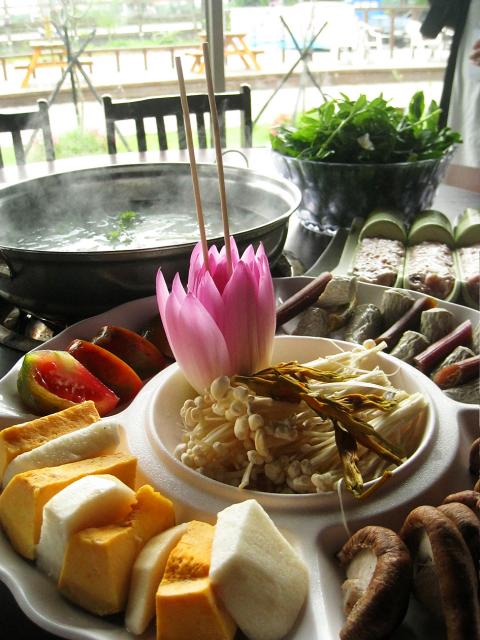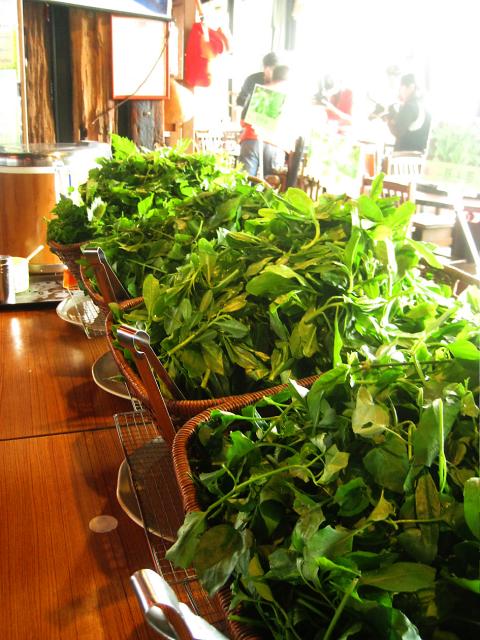The Cherry Field Restaurant, though established by an immigrant from Taipei, has become one of Hualien’s showcase dining establishments. Health is front and center at Cherry Field, as owner Chen Ying-mei (陳櫻美) created the restaurant after coming to Hualien to recover from surgery for thyroid cancer. Friends from around the county, including Hakka, Hoklo and Aboriginal people, told her about many different folk remedies making use of Hualien’s vast selection of flora, much of it ignored by mainstream agriculture. She has included this experience in the creation of Cherry Field, a hot pot restaurant whose main feature is its buffet of five kinds of foraged wild greens that not only provide a unique flavor, but also all kinds of healthful benefits (including reduced cancer risk).
Personally I am always slightly dubious about restaurants that put health before flavor, as their claims for various therapeutic effects seem to be little more than an excuse for dishes lacking either character or balance. I was therefore rather skeptical about Cherry Field, but the buffet of vibrant-looking greens on the sideboard looked remarkably appealing. Staff encourage diners to use a mixture of all five available greens, which are selected from a range of 16, depending on availability. I had not heard of many of these plants, and the selection of nine herbal broths into which these greens were to be immersed was equally unfamiliar, though I did recognize aged radish and ginseng. The broths are all light, and need the wild greens to give them complexity. It is further enriched by meat, fish and other mainstream vegetables. A healthy hot pot (養生火鍋) with meat is NT$390 a head, featuring unlimited access to wild greens, chicken, pork and fish. A vegetarian version with a good selection of mushrooms to replace the meat is NT$300.
If the mix of wild greens is simply too medicinal in flavor (and it has to be admitted, these greens mostly fall into the category of bitter herbs, which accounts for their lack of popularity in the regular vegetable market, and is also a reason why they can grow successfully without the aid of pesticides), Cherry Field offers a wide selection of innovative and mainstream hot pots from heavily marbled “snow flake” prime beef hot pot (霜降牛肉鍋, NT$390 a head) to pumpkin hot pot (南瓜鍋, NT$250 a head). While there are plenty of vegetarian options available, meat eaters are catered to with a plentiful selection of choice and prime cuts.

Photo: Ian Bartholomew, Taipei Times
Cherry Field is primarily a hot pot restaurant and is ideally suited for tables of four and above. That said, the establishment also offers a selection of individual sets and a la carte dishes, many of them vegetarian. Quality is well above average and its pork trotter with dry pickled Chinese mustard (陳梅弄豬手, NT$200) and mountain yam with monkey head mushrooms (山藥猴頭菇, NT$200) are highly recommended.
Although the setting at Cherry Field is casual, considerable care is taken over presentation, and a high point of a hot pot meal is the immersion of a lotus flower into the pot at the beginning of the meal. Inevitably, health benefits are attributed to the flower, but the effect is also quite beautiful, and gives the meal a lovely sense of theater. The big cavernous interior of the restaurant can be a bit intimidating for couples, but the space has been well divided to provide a degree of intimacy for smaller tables.
Service is efficient and staff are helpful in instructing diners in the best way of navigating the complex menu. The selection of food is wide enough that healthy eaters and gourmands can all find some degree of satisfaction, and for those who find something that really flips their switch, many of the condiments used in the preparation of food at Cherry Field (most made by the restaurant), are also available to take home. It goes without saying that Cherry Field’s food ticks all the health boxes from high fiber, organic, low salt and of course no MSG.

Photo: Ian Bartholomew, Taipei Times

Towering high above Taiwan’s capital city at 508 meters, Taipei 101 dominates the skyline. The earthquake-proof skyscraper of steel and glass has captured the imagination of professional rock climber Alex Honnold for more than a decade. Tomorrow morning, he will climb it in his signature free solo style — without ropes or protective equipment. And Netflix will broadcast it — live. The event’s announcement has drawn both excitement and trepidation, as well as some concerns over the ethical implications of attempting such a high-risk endeavor on live broadcast. Many have questioned Honnold’s desire to continues his free-solo climbs now that he’s a

As Taiwan’s second most populous city, Taichung looms large in the electoral map. Taiwanese political commentators describe it — along with neighboring Changhua County — as Taiwan’s “swing states” (搖擺州), which is a curious direct borrowing from American election terminology. In the early post-Martial Law era, Taichung was referred to as a “desert of democracy” because while the Democratic Progressive Party (DPP) was winning elections in the north and south, Taichung remained staunchly loyal to the Chinese Nationalist Party (KMT). That changed over time, but in both Changhua and Taichung, the DPP still suffers from a “one-term curse,” with the

Jan. 26 to Feb. 1 Nearly 90 years after it was last recorded, the Basay language was taught in a classroom for the first time in September last year. Over the following three months, students learned its sounds along with the customs and folktales of the Ketagalan people, who once spoke it across northern Taiwan. Although each Ketagalan settlement had its own language, Basay functioned as a common trade language. By the late 19th century, it had largely fallen out of daily use as speakers shifted to Hoklo (commonly known as Taiwanese), surviving only in fragments remembered by the elderly. In

William Liu (劉家君) moved to Kaohsiung from Nantou to live with his boyfriend Reg Hong (洪嘉佑). “In Nantou, people do not support gay rights at all and never even talk about it. Living here made me optimistic and made me realize how much I can express myself,” Liu tells the Taipei Times. Hong and his friend Cony Hsieh (謝昀希) are both active in several LGBT groups and organizations in Kaohsiung. They were among the people behind the city’s 16th Pride event in November last year, which gathered over 35,000 people. Along with others, they clearly see Kaohsiung as the nexus of LGBT rights.